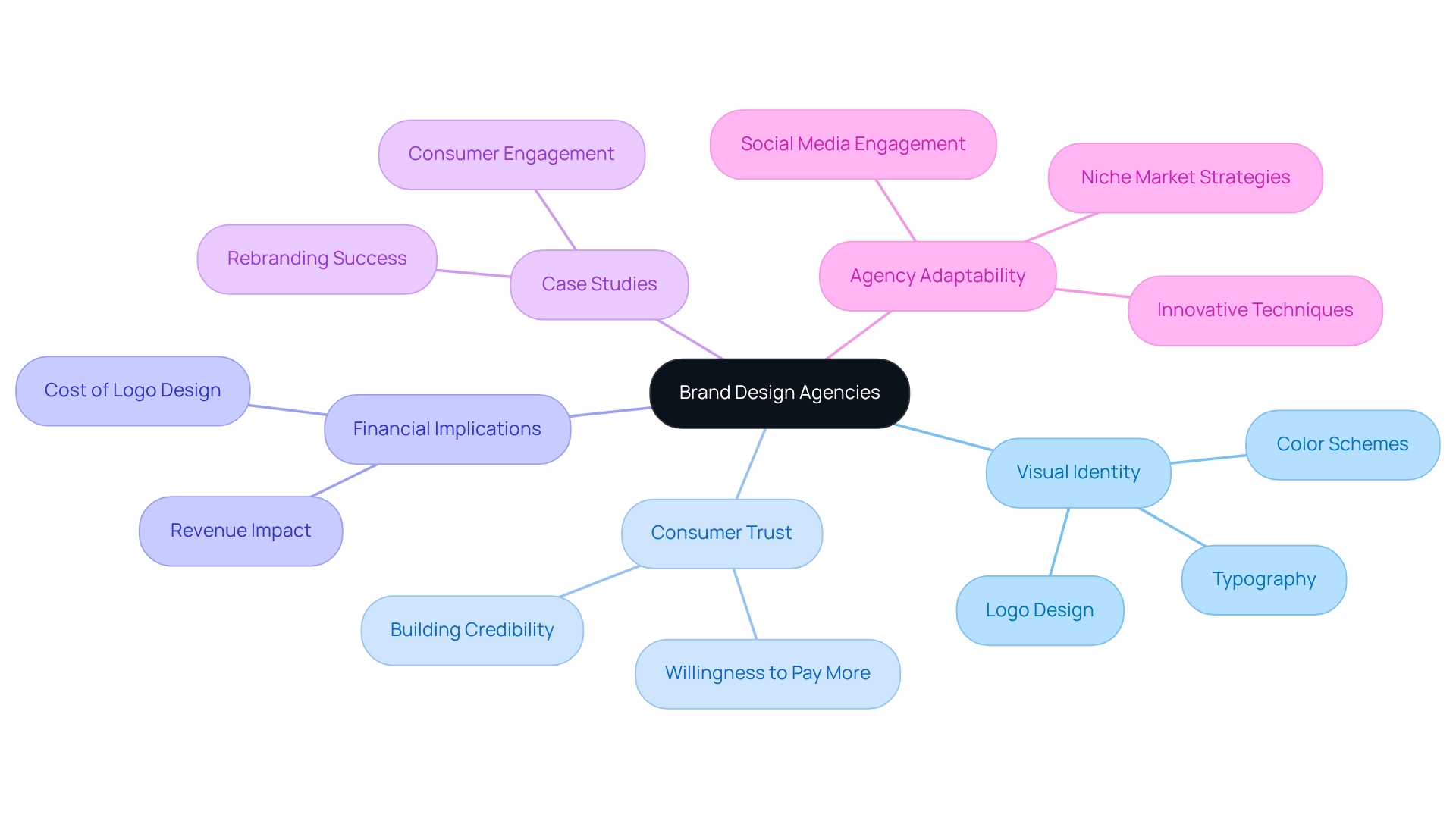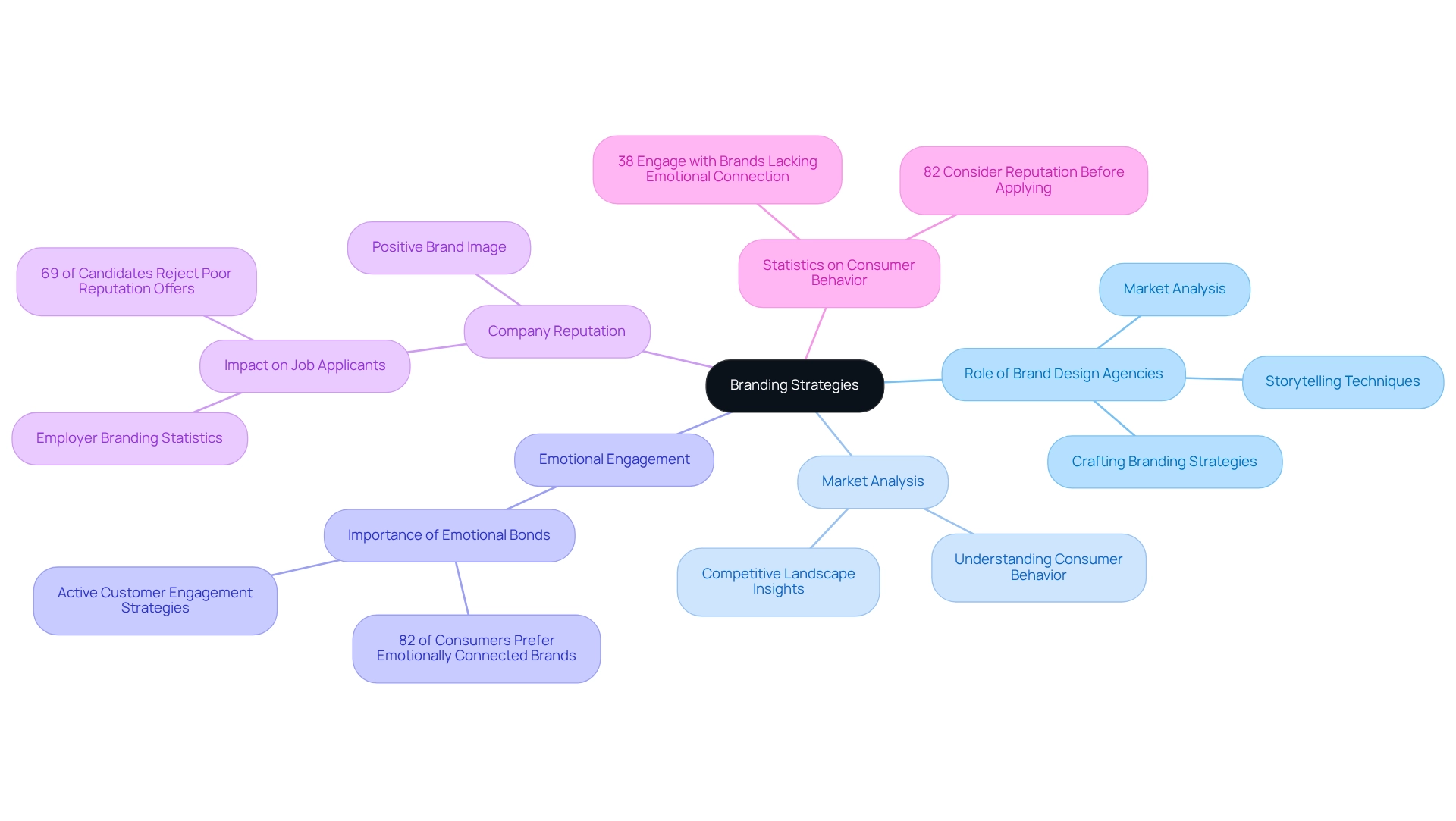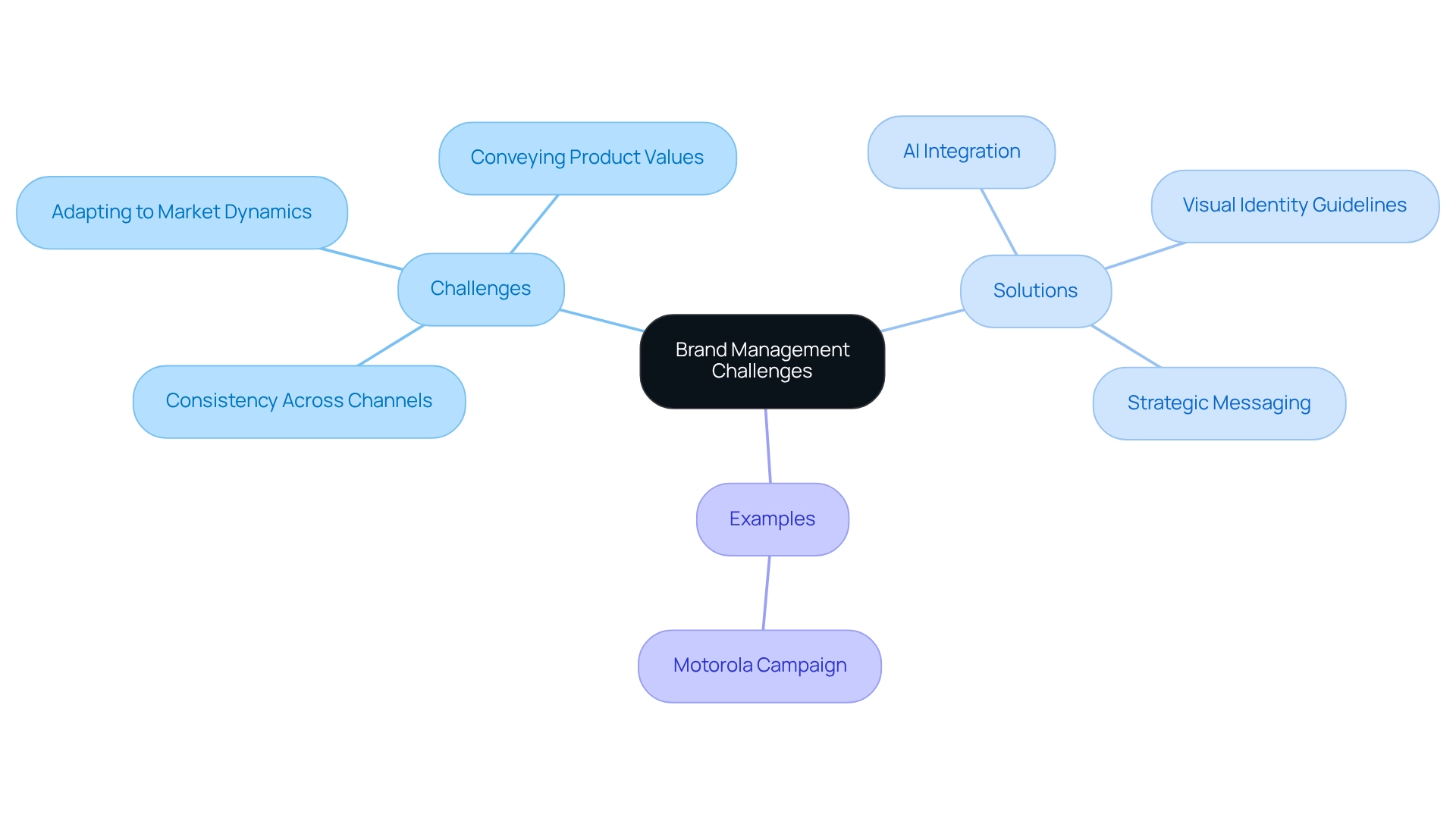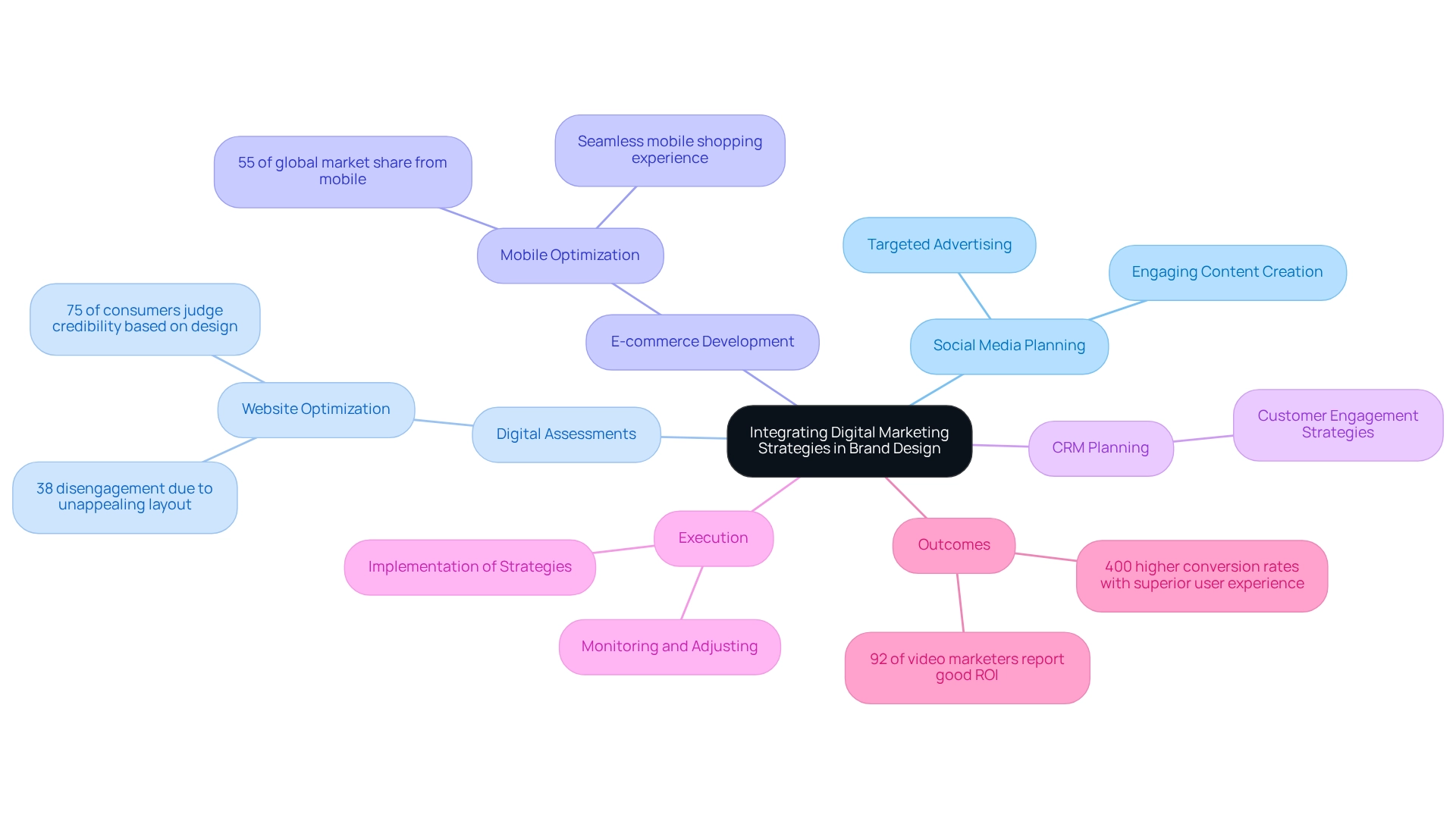Digital Branding Strategies
What Are Brand Design Agencies? Understanding Their Role in Your Branding Strategy
Overview
Brand design agencies are specialized firms that play a pivotal role in developing and enhancing a company’s visual identity and branding strategy. These agencies seamlessly combine strategic insight with creative design, crafting cohesive narratives that maintain consistency across branding elements. This consistency is essential for fostering consumer trust and loyalty in an increasingly competitive market. By leveraging their expertise, brand design agencies not only elevate a company’s image but also drive engagement and loyalty among consumers.
Introduction
In a landscape where brand identity can determine the success or failure of a business, the significance of brand design agencies has reached unprecedented levels. These specialized firms are pivotal in creating compelling visual identities that resonate with consumers, setting brands apart from their competitors. As the marketplace continues to evolve, agencies like WonderEight leverage strategic insights and creative expertise to craft narratives that not only embody a brand’s core values but also engage target audiences profoundly.
With the rising emphasis on sustainability and personalization in branding, the services provided by these agencies are evolving to align with contemporary consumer expectations. This article explores the multifaceted realm of brand design agencies, examining their essential services, the challenges they tackle, and the emerging trends poised to influence the future of branding.
Defining Brand Design Agencies: An Overview
Brand design agencies are specialized firms dedicated to crafting and elevating a company’s visual identity and market presence. By merging strategic insight with imaginative design, these agencies forge cohesive narratives that resonate profoundly with target audiences. They play a crucial role in shaping perception, ensuring that all visual components—logos, color schemes, and typography—harmonize with the core values and messaging of the brand.
In 2025, the importance of identity in marketing is paramount. A strong identity not only sets a business apart from its competitors but also fosters consumer trust and loyalty. Notably, 46% of consumers are willing to pay a premium for brands they trust, underscoring the necessity of building credibility through consistent quality and transparency.
This highlights the financial implications of corporate identity, as expenditures on logo design can range from entirely free to millions, with companies like Pepsi making substantial investments in their logos.
Visual identity significantly impacts recognition; research indicates that consistent branding can increase revenue by as much as 23%. This statistic underscores the power of a well-executed visual identity in enhancing market perception. As consumers increasingly prioritize brands that align with their values—70% feel a responsibility to purchase environmentally and socially conscious products—design firms must adapt to these expectations by creating identities that reflect these principles.
WonderEight exemplifies this adaptability, particularly in crafting identities for niche markets such as refined French cuisine in KSA. Their innovative approaches not only address the unique cultural landscape but also leverage imaginative effectiveness during challenging times, ensuring that identities remain relevant and engaging. Furthermore, WonderEight employs extensive communication and content generation strategies that enhance social media interaction, allowing companies to connect with their audiences across various platforms effectively.
Visual identity firms enhance aesthetic presence by implementing innovative techniques that resonate with contemporary trends. For instance, the surge of podcasting as a marketing platform—growing by 53% from 2021 to 2023—illustrates the evolving landscape where visual identity must extend beyond traditional media to engage audiences effectively.
Successful case studies further illustrate the impact of identity firms on visual representation. For example, a comprehensive rebranding initiative for a well-known snack company not only revitalized its image but also significantly enhanced consumer engagement and sales. Such transformations demonstrate how strategic planning can yield quantifiable results, reinforcing the organization’s role in shaping brand image.
Expert opinions consistently affirm the critical importance of visual identity in marketing. As the market continues to evolve, the ability of brand design agencies like WonderEight to create tailored solutions that improve business outcomes will remain a vital differentiator in the competitive landscape. By focusing on the financial ramifications of corporate identity and implementing effective strategies, WonderEight ensures that their clients achieve a robust market presence.

Core Services Offered by Brand Design Agencies
Brand design agencies offer a diverse array of services crucial for effective branding and marketing. These services encompass identity development, visual representation creation, packaging design, and environmental branding. Notably, firms like WonderEight deliver comprehensive marketing solutions, which include social media planning, digital assessments, CRM planning and execution, and e-commerce development—all aimed at enhancing both online and offline presence.
This multifaceted approach empowers brand design agencies to articulate their values clearly and engage meaningfully with their audiences. For example, a design agency might initiate an audit to evaluate a company’s current market positioning. Following this assessment, they can develop a tailored strategy that may involve logo redesign, website development, and targeted social media campaigns. Such cohesive marketing initiatives are essential, as research indicates that 75% of American consumers are more likely to remain loyal to brand design agencies that understand them on a personal level.
As Josh Howarth insightfully remarked, ‘It takes many good deeds to build a reputation, and only one bad one to lose it,’ underscoring the importance of sustaining a positive public image. Furthermore, the digital advertising sector has witnessed significant growth, with its market size projected to reach $20.7 billion, underscoring the increasing relevance of a robust online presence and the vital role of brand design agencies like WonderEight in this landscape.
Current trends in creative firms’ offerings reveal a heightened emphasis on transparency and customer engagement. With 39% of consumers willing to switch to more open companies, firms are adapting their strategies to foster trust and loyalty. Successful case studies, such as ‘Building Customer Loyalty Through Repeat Purchases,’ demonstrate that 37% of consumers develop loyalty after making five purchases, highlighting the importance of nurturing customer relationships beyond the initial sale.
As we look towards 2025, companies dedicated to creative solutions continue to innovate, providing options that align with evolving market demands. Their proficiency in conducting brand audits proves particularly effective in shaping strategies for brand design agencies, as it yields valuable insights that inform branding decisions. By leveraging these insights, firms like WonderEight can create impactful packaging concepts and comprehensive branding strategies that resonate with target audiences, ultimately driving business growth.
The Role of Brand Design Agencies in Crafting Effective Branding Strategies
Brand design agencies, such as WonderEight, are pivotal in crafting branding strategies that align with a company’s objectives and adapt to the dynamic market landscape. These agencies conduct comprehensive market analyses to understand consumer behavior and preferences, which are essential for shaping a company’s identity. By merging imaginative storytelling with strategic evaluation, WonderEight empowers businesses to articulate their unique value propositions and forge emotional connections with their target audiences.
Consider a scenario where WonderEight collaborates with a startup to develop a compelling narrative that sets it apart from competitors. This narrative serves as the cornerstone for all branding elements, ensuring consistency across logos, marketing materials, and digital presence. The significance of emotional engagement is underscored by research indicating that 82% of consumers choose to purchase from companies with whom they share a strong emotional bond, compared to only 38% who engage with those lacking such a connection.
This underscores the imperative for agencies like WonderEight to cultivate emotional ties through personalized experiences and proactive customer engagement. Moreover, the role of market research in branding is critical. It not only informs branding strategies but also provides insights into the competitive landscape. Statistics reveal that 69% of job applicants are likely to reject offers from companies with poor reputations, highlighting the need for a positive company image in recruitment and overall market positioning.
Additionally, 82% of potential candidates consider a company’s reputation before applying for a job, further demonstrating the impact of branding on attracting top talent. Consequently, brand design agencies such as WonderEight are indispensable partners in navigating these complexities, ensuring that branding strategies are not only visually compelling but also strategically sound and aligned with consumer expectations.

Addressing Brand Management Challenges with Design Expertise
Product management presents a myriad of challenges, particularly in maintaining consistency across diverse channels, adapting to evolving market dynamics, and effectively conveying product values. Brand design agencies are pivotal in assisting businesses to navigate these complexities, leveraging their expertise in visual identity and strategic messaging. For instance, a company grappling with inconsistent identity across its digital and physical platforms can collaborate with a creative firm like WonderEight to establish comprehensive identity guidelines.
These guidelines serve as a roadmap for uniformity in all communications, enhancing recognition—evidenced by the fact that labeled websites are trusted by 84% of consumers, underscoring the critical role of consistency—and fostering consumer trust and loyalty.
As we approach 2025, managers will encounter heightened challenges, including the necessity to integrate AI technologies that personalize customer experiences and automate interactions. Brand design agencies address these challenges by ensuring consistency across all touchpoints, from social media to packaging design. For example, WonderEight employs AI-driven analytics to customize marketing approaches that resonate with target audiences, guaranteeing a unified experience.
Their extensive digital offerings, which encompass social media oversight, digital planning, e-commerce services, CRM strategies, and digital evaluations, are designed to enhance corporate identity and market presence. Expert insights reveal that a signature color can boost recognition by 80%, highlighting the significance of cohesive visual elements in marketing strategies, a principle that WonderEight successfully implements in their projects. Case studies, such as the digital campaign executed for Motorola by WonderEight, illustrate how creative firms can effectively tackle consistency challenges.
This campaign not only engaged audiences but also achieved quantifiable results, including a notable increase in engagement metrics and consumer interactions, demonstrating the firm’s ability to enhance audience engagement through strategic planning and messaging. By partnering with brand design agencies like WonderEight, businesses can ensure that their identity remains robust and uniform, ultimately leading to improved consumer loyalty and market presence.

Integrating Digital Marketing Strategies in Brand Design
In today’s digital landscape, brand design agencies recognize that merging online marketing strategies with visual identity is crucial for enhancing visibility and engagement. WonderEight, a comprehensive branding and digital solutions firm, collaborates with these agencies to offer a range of services, including:
- Social media planning
- Digital assessments
- E-commerce development
- CRM planning
- Execution
This partnership is centered on crafting cohesive online experiences that authentically represent a company’s identity. A vital component of this process is optimizing websites for user experience; studies reveal that visitors form opinions about a website in just half a second, with 38% likely to disengage if the content or layout is unappealing.
Furthermore, 75% of consumers assess a company’s trustworthiness based on its website design, underscoring the importance of an attractive and functional site.
WonderEight excels in creating engaging social media content and implementing targeted digital advertising campaigns to reach wider audiences. For instance, a visual identity firm may design a striking website that not only showcases a company’s products but also integrates SEO techniques to enhance search engine rankings. This dual strategy not only drives increased traffic to the site but also boosts conversion rates, with websites offering superior user experiences achieving up to 400% higher conversion rates.
Successful case studies highlight the potency of this integration. A company focused on mobile optimization found that mobile devices account for 55% of global market share, emphasizing the necessity of providing a seamless mobile shopping experience to attract and retain customers. Additionally, with 92% of video marketers asserting that video advertising yields a favorable ROI, brand design agencies can further elevate engagement by incorporating video content into their digital marketing strategies.
By aligning digital marketing efforts with visual identity, agencies like WonderEight can significantly enhance visibility and interaction, making this approach essential for businesses in 2025. Product managers must stay informed about digital marketing trends to adapt their strategies effectively and ensure their brands remain competitive in this evolving landscape.

Case Studies: Success Stories from Brand Design Agencies
Numerous case studies underscore the transformative power of brand design agencies like WonderEight in driving client success across diverse industries and regions. A notable example involves a well-known beverage company from Toronto that collaborated with WonderEight to revamp its packaging and branding strategy. This partnership not only rejuvenated the company’s image but also resulted in a significant rise in market share and consumer engagement.
In another compelling case, a tech startup located in San Francisco enlisted WonderEight to develop a comprehensive branding plan that included a new logo, website, and marketing materials. This strategic collaboration enabled the startup to secure vital funding and establish a robust market presence.
These success stories highlight the critical role that WonderEight plays in enhancing branding efforts globally. Aimee Meester, CEO and lead visionary at Madison Taylor Marketing, asserts, “A strong identity distinguishes itself in a market saturated with options by resonating deeply with its audience.” Research indicates that 27% of consumers prioritize personalization when fostering loyalty to a brand, underscoring the significance of customized marketing approaches in which WonderEight excels.
Furthermore, the case study titled ‘Emotional Connection Drives Customer Acquisition‘ illustrates how emotional ties between companies and consumers significantly influence purchasing decisions. Studies reveal that consumers are more inclined to purchase from brands they feel connected to, emphasizing the importance of branding and marketing strategies that effectively convey a company’s narrative and nurture these emotional connections.
WonderEight measures ROI by closely collaborating with clients to ensure that the right message is delivered through the most suitable channels, tailored to their target audiences. The impact of branding extends beyond aesthetics; it is a strategic imperative for businesses in competitive markets. Effective marketing can lead to substantial enhancements in market share and customer loyalty, making it essential for companies to partner with talented brand design agencies like WonderEight to navigate the complexities of contemporary marketing.
Emerging Trends in Brand Design: What to Expect
The branding landscape is undergoing a significant transformation, driven by emerging trends that are reshaping identity design for 2025. A pivotal trend is the increasing focus on sustainability, where companies must demonstrate their commitment to social responsibility. This shift is not merely a trend but a necessity; products making multiple ESG-related claims are growing at nearly double the rate of those making singular claims.
This trend indicates that consumers are more inclined to view brands with comprehensive sustainability approaches as authentic and dedicated to genuine ESG practices. As Sherry Frey, vice president of total wellness at NielsenIQ, articulates, “They can accomplish both at the same time by employing a thoughtful, fact-based, consumer-focused ESG approach.”
In addition to sustainability, the rise of personalized consumer experiences is becoming paramount. Brands are leveraging data analytics to craft tailored marketing strategies that resonate with individual preferences, thereby enhancing customer engagement and loyalty. This personalization trend is substantiated by consumer data indicating a strong preference for companies that provide customized experiences.
Furthermore, the incorporation of artificial intelligence in creative processes is transforming how branding firms operate. AI tools empower designers to analyze consumer behavior and preferences more effectively, facilitating the creation of innovative and relevant branding solutions.
As these trends evolve, brand design agencies are positioned to play a crucial role in guiding businesses through the complexities of contemporary branding. Notable case studies illustrate this shift; for instance, brands that have adopted holistic ESG strategies not only enhance their market presence but also achieve measurable growth. A study titled “Holistic ESG Claims for Greater Impact” reveals that consumers respond more favorably to products that make multiple ESG-related claims rather than just one, underscoring the necessity for companies to embrace a holistic approach to ESG.
Additionally, initiatives like TravelPerk’s GreenPerk, which assists businesses in measuring and reducing their travel carbon footprint, exemplify how companies are actively addressing sustainability within their operations. By embracing these emerging trends, brand design agencies can aid clients in navigating the intricate branding landscape, ensuring they remain competitive and relevant in an ever-evolving market.
Conclusion
Brand design agencies are pivotal in shaping successful brand identities, deftly navigating the complexities of consumer expectations and market dynamics. By merging strategic insights with creative design, these agencies craft compelling visual narratives that resonate with audiences and cultivate brand loyalty. The significance of a cohesive and engaging brand identity is underscored by its financial implications; a well-executed visual identity can substantially enhance revenue and consumer trust.
As the landscape evolves, brand design agencies like WonderEight are adeptly adapting to emerging trends such as sustainability and personalization. By developing tailored branding strategies that reflect contemporary values, they ensure businesses remain relevant and engaging. Their comprehensive services, ranging from brand strategy development to digital marketing, empower clients to amplify their market presence across various platforms.
The successful case studies highlighted throughout this article illustrate the transformative power of effective branding. These examples not only showcase the tangible benefits of collaborating with brand design agencies but also emphasize the necessity of emotional connections in driving consumer loyalty. As branding shifts toward a more consumer-centric approach, the role of design agencies becomes increasingly vital in crafting strategies that align with both brand values and consumer expectations.
In conclusion, the expertise of brand design agencies is indispensable for businesses striving to thrive in a competitive market. By leveraging innovative design strategies and remaining attuned to emerging trends, these agencies enable brands to connect authentically with their audiences, fostering lasting relationships that drive success. The future of branding rests with those who can adeptly navigate this intricate landscape, making the partnership with a skilled brand design agency a strategic imperative for any business.
Frequently Asked Questions
What are brand design agencies?
Brand design agencies are specialized firms that focus on creating and enhancing a company’s visual identity and market presence through strategic insight and imaginative design.
Why is a strong brand identity important in marketing?
A strong brand identity differentiates a business from competitors, fosters consumer trust and loyalty, and can lead to consumers being willing to pay a premium for trusted brands.
How does visual identity affect consumer behavior?
Consistent branding can increase revenue by up to 23%, and 70% of consumers feel a responsibility to purchase from brands that are environmentally and socially conscious.
What services do brand design agencies offer?
Brand design agencies provide services such as identity development, visual representation creation, packaging design, environmental branding, social media planning, digital assessments, CRM planning, and e-commerce development.
How do brand design agencies like WonderEight adapt to market trends?
Agencies like WonderEight adapt by crafting identities that reflect current consumer values, such as sustainability, and employing innovative techniques to engage audiences across various platforms.
Can you provide an example of a successful rebranding initiative?
A comprehensive rebranding for a well-known snack company revitalized its image and significantly enhanced consumer engagement and sales, demonstrating the effectiveness of strategic planning in branding.
What is the significance of customer engagement in branding?
Engaging with consumers on a personal level fosters loyalty, with research indicating that 75% of American consumers are more likely to remain loyal to brand design agencies that understand them personally.
What role do brand audits play in branding strategies?
Brand audits help agencies evaluate a company’s market positioning and inform tailored strategies for branding decisions, including logo redesign and targeted marketing campaigns.
How are brand design agencies addressing the shift towards transparency?
With 39% of consumers willing to switch to more open companies, agencies are adapting their strategies to foster trust and loyalty through transparency and customer engagement.
What trends are influencing the future of brand design agencies?
Trends include a focus on transparency, customer engagement, and the increasing relevance of a robust online presence, as the digital advertising sector continues to grow.



